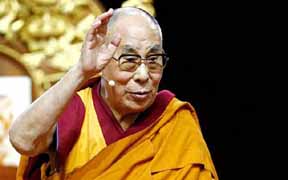 BEIJING: China today warned India that bilateral ties may suffer “damage” and peace and stability of the border areas could be affected if it allows Tibetan spiritual leader Dalai Lama to visit Arunachal Pradesh, which Beijing claims is part of southern Tibet.
BEIJING: China today warned India that bilateral ties may suffer “damage” and peace and stability of the border areas could be affected if it allows Tibetan spiritual leader Dalai Lama to visit Arunachal Pradesh, which Beijing claims is part of southern Tibet.
“We are seriously concerned about the relevant information,” Chinese Foreign Ministry spokesperson Lu Kang told a media briefing here replying to a question about reports that India has granted permission to Dalai Lama to visit Arunachal Pradesh at the invitation of the Chief Minister.
“China’s position on the eastern section of China India border is consistent and clear. The Dalai clique is engaged in anti-China separatist activity and has very disgraceful behavior on issues relating to China-India boundary question,” Kang said.
The Indian side is well aware of the severity of the Dalai Lama issue as well as the sensitivity of the China-India boundary question, he said.
“Under such circumstances India’s invitation to the Dalai Lama for activity in the disputed areas between China and India will only damage peace, stability of the border areas as well as the bilateral relationship between China and India,” Kang said.
“We require the Indian side to honor the political commitment to Tibet-related issues and abide by the bilateral consensus on boundary question,” he said.
India also should “refrain from taking any action that may complicate the issue, do not provide any platform for anti-China separatist activities by the 14th Dalai Lama,” he said.
“Only by doing so can we maintain sound and steady growth of the bilateral relations,” he added.
Asked about assertions by External Affairs spokesperson Vikas Swarup that Dalai Lama has visited the state in the past, Kang said “making one mistake does not mean that you can make another mistake”.
“As I just said, India’s invitation to the Dalai Lama for activity in the disputed area between China and India is like providing a platform for anti-China separatist activities. It does no good to peace and tranquility in the border areas as well as the development of China-India relations,” he said.
China considers Arunachal Pradesh as part of southern Tibet and routinely objects to visits by Dalai Lama, Indian leaders as well as foreign dignitaries.
The border dispute covers the 3,488-km long Line of Actual Control (LAC).
India asserts that the dispute covered Aksai Chin area which was occupied by China during 1962 war.
On October 24, China took exception to the visit by Richard Verma, the US envoy in India, to Arunachal Pradesh which it claims as southern Tibet, saying any interference by Washington in the Sino-India boundary dispute will make it “more complicated” and “disturb” hard-won peace at the border.
Objecting to Verma’s visit, Lu had told a media briefing here that China is firmly opposed to the visit.
Verma visited the province on October 22 at the invitation of Arunachal Pradesh Chief Minister Pema Khandu, who has also invited Dalai Lama to the state early next year.
“We have also noted that the place visited by senior US diplomatic official is a disputed region between China and India. We are firmly opposed to his visit,” he had said.
Rebuffing China for objecting to Verma’s visit to Arunachal Pradesh, India had said there was “nothing unusual” about his trip to a state which is an integral part of the country.
“The US Ambassador visited Arunachal Pradesh, a state which is an integral part of the country to which he is accredited. There is nothing unusual in it,” Swarup had said.
Lu said both India and China are resolving the issue though bilateral consultations and negotiations and “any third party with a sense of responsibility should respect efforts made by China and India for peace reconciliation and tranquility rather than the opposite,” he said.
The behavior by the US contrasts the efforts made by China and India, he had said.
“It will only make the dispute more complicated, disturb the hard-won peace and tranquility of border areas and sabotage peaceful development of the region.
“We urge the US to stop its interference in the boundary issue between China and India and make more contribution to regional peace and stability,” he said.–PTI





